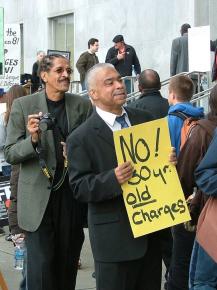A legal victory for the SF8
reports on a long-awaited decision in the prosecution of former Black political activists accused of killing a San Francisco police officer.
CHARGES AGAINST four of the San Francisco 8--former Black community activists, Black Panthers and others accused of taking part in a 1971 killing of a San Francisco police officer--were dropped July 6 when prosecutors were forced to admit that they had insufficient evidence to go to trial.
Those cleared are Ray Boudreaux, Richard Brown, Hank Jones and Harold Taylor. Jalil Muntaqim pled no contest to a lesser charge--conspiracy to commit voluntary manslaughter. Muntaqim received credit for time served and three years' probation. He will return to New York to fight for parole.
After consulting with the other defendants, Herman Bell entered a plea a week earlier. Francisco Torres, who maintains his innocence, still faces a court hearing on August 10. His attorney intends to file a motion to dismiss the charges against his client.
The victory on July 6 was the result of years of unified resistance on the part of the San Francisco 8, backed by an impressive array of support organized through the Committee for the Defense of Human Rights (CDHR), based in Pasadena, Calif.

According to the Free the SF8 Web site:
[The eight men] were arrested January 23, 2007 in California, New York and Florida on charges related to the 1971 killing of a San Francisco police officer. Similar charges were thrown out years ago after it was revealed that police used torture to extract confessions when some of these same men were arrested in New Orleans in 1973.
Richard Brown, Richard O'Neal, Ray Boudreaux and Hank Jones were arrested in California. Francisco Torres was arrested in Queens, New York. Harold Taylor was arrested in Florida. Two of the men charged--Herman Bell and Jalil Muntaqim--have been held as political prisoners for over 30 years in New York state prisons. A ninth man--Ronald Stanley Bridgeforth--is still being sought.
The campaign to free the SF8 is a good example of effective organizing to win victory through activism. CDHR members used an old-fashioned combination of defendant solidarity, face-to-face organizing and outreach using the Drop the Charges newsletter at activist gatherings, including Critical Resistance held in Oakland in Septmber 2008, the Caravan for Justice, Socialism 2009 and courthouse solidarity rallies that drew hundreds.
The SF8 also had able lawyers--and this combined with the activism was central to stopping California Attorney General Jerry Brown's effort to jail the SF8.


